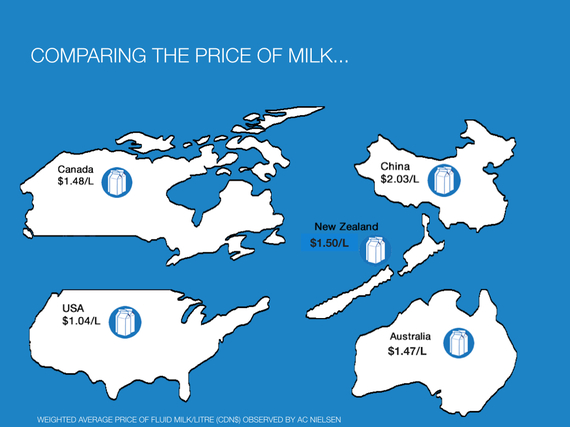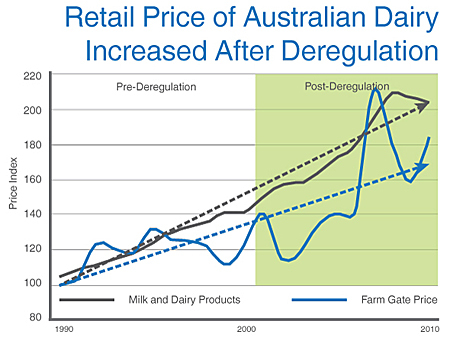The recent report from the Conference Board of Canada indicates a disturbing trend of think tanks offering what amounts to bad business advice.
It is not a surprise that the Conference Board calls for the dismantling of Canada's supply management system, and the fallacies and misleading assertions used to support that call are common in some circles.
One assertion, that supply management costs the average Canadian family an extra $276 per year at the grocery store for their dairy products, is based on the assumption that removing supply management would reduce the farm gate price in Canada to the so-called "world" farm gate price.
But this argument ignores the reality that farm and retail prices are not so directly linked, or that this "world price" is not what farmers elsewhere get paid all the time!
There is a better bet to compare retail prices around the world. The market research firm Nielsen has one of the most extensive resources for compiling data from millions of price points. In 2013, milk in Australia and New Zealand cost roughly the same as what we pay in Canada -- a weighted average of $1.47 to $1.50 per litre (yes there are $1/litre offerings, just like one can find that price when buying in 4-litre formats in some of the major markets in Canada).

The fact is the farm is just the first link in the supply chain. There are other links between the farm gate and your refrigerator that are determining and protecting their own margins and, where they don't have supply management, they have to deal with increased pricing volatility.
It has been proven time and again around the world that deregulation in the dairy sector does not lead to lower prices for consumers. Take the Australian example, a favourite of critics of supply management.
The Australian fresh milk market was
deregulated in 2000, and almost immediately farm prices began to fluctuate wildly. But retail prices increased steadily, accentuated by a tax levied to help farmers with the transition. It was bad for farmers, and did not benefit consumers.

In the United States, milk averages $1.04 per litre at retail. The United States experience allows us to examine the angle of the bad business advice: the average farm size is 183 cows, close to the average size the Conference Board recommends for Canada, hanging their hats on the "sales" realized by the farm, but carefully not looking at what could be the net revenue, which is important to small businesses. This 183-cow farm in the U.S lost money in 2012 -- an estimated eight cents for every litre produced, according to USDA.
It is only through a combination of government subsidies, working a second job to supplement farm income, and hopes of a better year (this year promises to be), that these farmers were able to keep going, as long as they were not too highly leveraged. To keep debts low, a small business needs to be careful in what technology they invest! It seems too easy to forget that farms, like other small businesses, need to make money to
keep producing food.
European farmers know too well the harsh realities of milk prices that fall below the cost of production. Twice in recent years European farmers have taken to the streets in protest of a system that forces artificially low prices on dairy products and makes it all but impossible to eke out a living on a European livestock farm.
Recently, dairy farmers in the U.K. have protested a move by a supermarket to cut price with concern over the impact of "
devaluing milk in the eyes of the consumer." Similarly,
Canadian food manufacturers are pushing back on pressure from retailers over what they see as a move to cheapen their brand, and want a "
code of conduct". When a business invests to build the value of their brand or product, downward pressure from distributors is not welcome. Then there are distributors taking a 30 to 50 per cent margin on a product, and letting producers be blamed for the price.
Canadians are third in the world in having the
most affordable food, after U.S. and U.K. And it's safe and high quality too. While farmers don't think milk should be cheaper than water, the retail price is not set by supply management. Supply management regulates what is paid to the farmer at the farm gate for raw milk, so farmers can cover the cost of production and make a living from the farm, which operates 365 days a year.
I will conclude with an observation that, within supply management, the dairy industry has surpassed the Conference Board's most ambitious scenario in terms of new jobs creation: EcoRessources has found that
jobs have increased 2.8 per cent in just two years: from 115,104 in 2009 to 118,330 in 2011.





